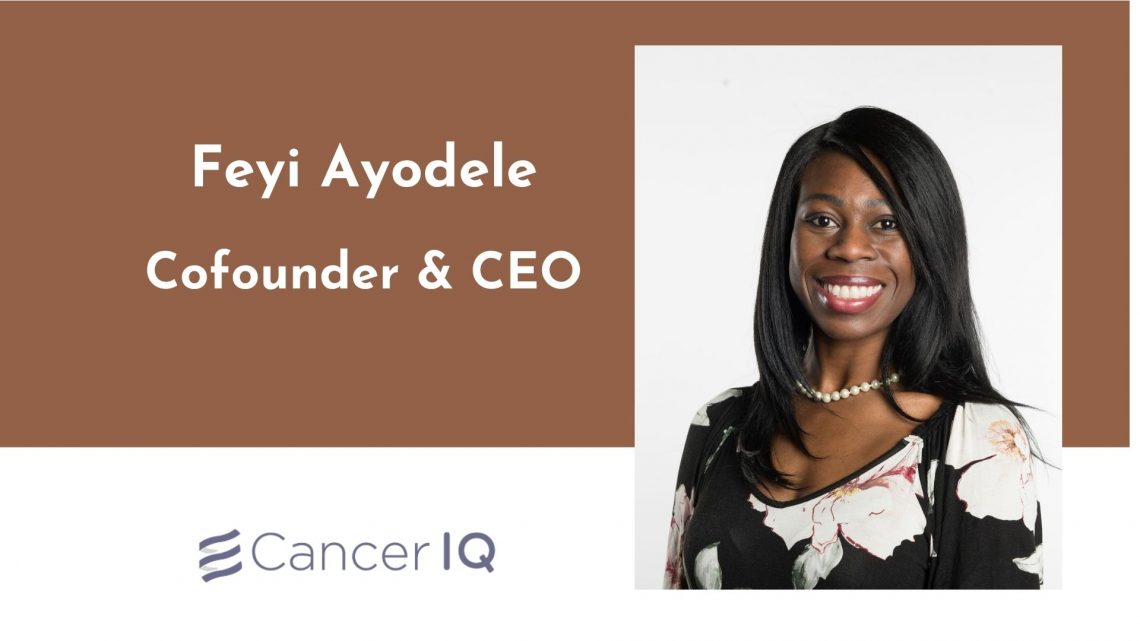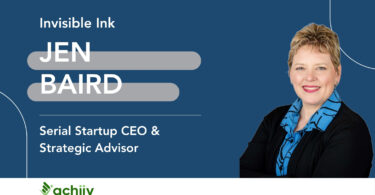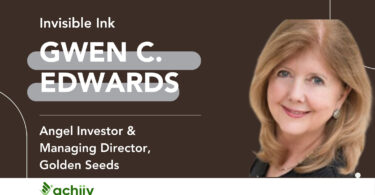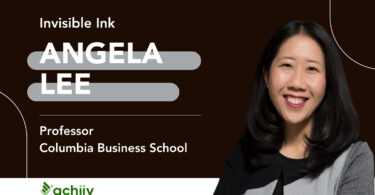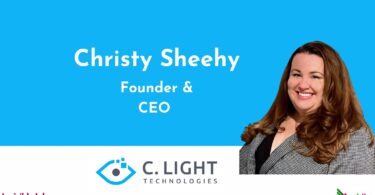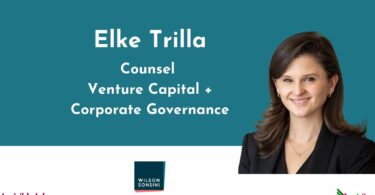About
Feyi Ayodele is the CoFounder and CEO of CancerIQ, a startup that uses genetic information to predict, preempt and prevent cancer. Feyi started her career in finance but switched to healthcare to fulfill her desire to build a company that made a tangible difference in people’s lives.
Summary
Feyi Ayodele started off her career as a promising star in finance, but soon realized she wanted to do something more fulfilling. But as a female Black founder with no prior healthcare experience, it wasn’t easy to get funding, customer orders from big, bureaucratic health systems and traction in building her business.
In this episode, Feyi talks about how she overcame all the strikes against her and still succeeded in getting funded, the secrets to getting to product-market fit quickly, how not to short-change yourself when pricing your products, how to reframe obstacles that will inevitably arise, and the business benefits of being a diverse woman founder in a heavily male dominated industry.
Episode highlights
- How CancerIQ’s approach differs from traditional approaches
- Why Feyi switched from a career in finance to healthcare
- The secret to winning over skeptical investors
- How to play the entrepreneurship game intelligently
- Why community matters and how to build one
- The smart way to think about customer value
- How to stay focused on what matters
- How to get customers when you haven’t built a product yet
- How to be a smart pricer, and avoid common pricing pitfalls
- How to manage finances as a CEO, whether you love or hate finance
- How to create a network when you don’t have one
- How to overcome barriers
- The challenges and rewards of being a female founder
- Advice to other female founders
Links & Resources
CancerIQ – the company Feyi founded
1871 – Chicago based incubator and founder support community
Matter – Chicago-based healthcare incubator
Rock Health – a venture fund and community supporting health-tech startups
Zenefits – subscription based HR management platform
About CancerIQ
Feyi Ayodele is Cofounder and CEO of CancerIQ. CancerIQ’s “cancer risk clinic in a box” makes it faster and less expensive for physicians to identify high-risk patients and navigate them towards services that can pre-empt or prevent cancer.
CancerIQ’s product suite contains predictive analytics and screening tools to identify at-risk patients; clinical guidance with proven outcomes; a digital genetic test ordering platform and patient management and education tools.
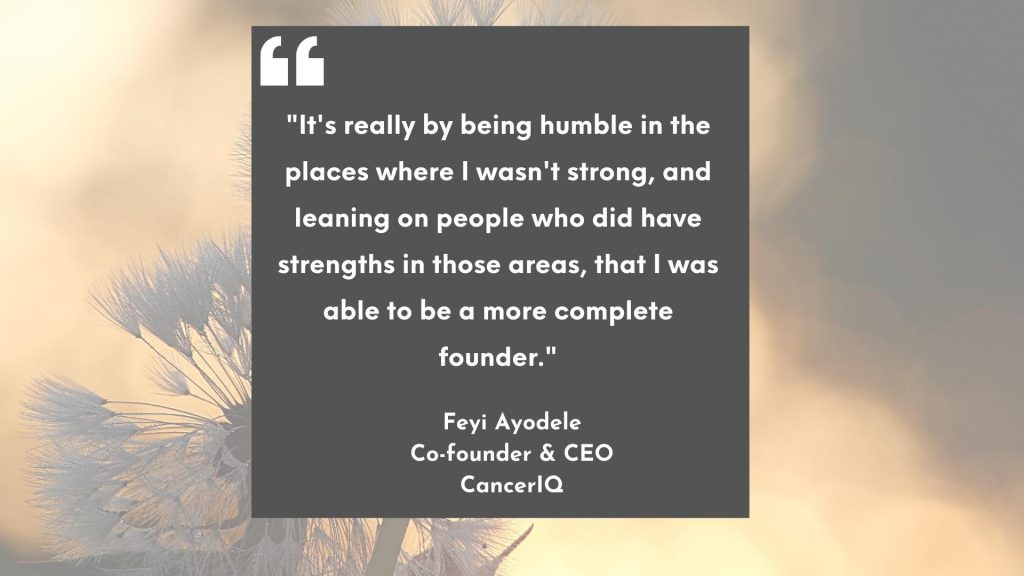
Interview transcript:
Shubha Chakravarthy: Thank you, Feyi. It’s really exciting to have you here today. I know a little bit about your company CancerIQ and it is truly inspiring. Can you tell us a little bit what CancerIQ is and what the company does?
Feyi Ayodele: CancerIQ is a company with a mission to end cancer as we know it through early detection and prevention of the disease. We offer a platform that helps your provider stratify risk and understand patients who have a predisposition, so that they can get ahead of cancer instead of having to respond to it.
Shubha Chakravarthy: What’s the core of your approach to doing that?
Feyi Ayodele: Our secret sauce is using all available data possible. Instead of just using age as something to understand people’s risks, we use genomic information, we use behavioral and social information, and even adherence information to predict who might be at risk of getting a late stage cancer.
Shubha Chakravarthy: So, what gave you the idea for this business?
Feyi Ayodele: The model that we enable with CancerIQ is something that has really been tried and tested with by thought leaders in academic centers, including my mother, who is a great mom and a wonderful medical oncologist and geneticist. She is also a MacArthur genius award winner for her work as a surgeon. She has been doing this for a very long time.
The challenge and the problem that we’re trying to solve at CancerIQ is really democratizing access to that kind of service because not all patients can be seen by my mom. Not all patients can be seen in an academic center.
We need to make it so that the everyday provider in front of you is as capable of offering a kind of precision prevention service as those in academia. Not every provider has the clinical confidence and the workflow tools that they need to make it easy.
Shubha Chakravarthy: I looked at your professional profile briefly and you’ve got a very heavy finance background. Looking at the whole STEM field and getting funding in that — STEM is hard enough as it is.
So, how did you make that switch? What made you decide to say, I’m going to switch from finance into this completely new medical field.
Feyi Ayodele: I believe I was thinking about my long-term career progression. I think as a finance person, you are always really just looking at the financial aspects of things. I started my career in investment banking and then I moved on to private equity and when you are trying to add value at the point when you are actually investing in companies as a private equity investor, you realize that it helps to have some sort of industry expertise or some sort of operating experience.
So, to start building some of that operating experience, I transitioned from finance to management consulting, with McKinsey and, lo and behold at McKinsey, I found, I still wasn’t getting that operating experience that I felt I needed to really scale businesses and make an impact. So that’s when I chose to take some time to really explore different opportunities.
Healthcare was near and dear to my heart and it was through the experience that I had working in healthcare with my mother at the University of Chicago that I felt more passionate about solving problems there than I felt about the generic problem set in the C-suite of companies across the country.
Shubha Chakravarthy: So, you have an idea, you found your passion when you were working at the U of C, what happened next?
How did you think about approaching this? How did it coalesce into a business idea? How did you think about funding? Can you just walk us through it? Put us in the room — make us a fly on the wall.
Feyi Ayodele: Yeah. So, I think one of the advantages that I had being a finance professional was to just understanding how investors think.
As a founder of a company, you are the biggest investor in the company, but I took the same approach that an investor would, in evaluating the opportunity.
I knew there was a strong clinical need and I knew there was a potential solution. But one thing is important to figure out as a founder — that is how you are gonna make money doing what you are doing.
That is where my background as a finance professional has probably put me in an advantage. Very early on in the company I figured out our business model. I figured out the return on investment that I was going to try and deliver to every customer that I tried to work with.
I knew that investors were going to want to see this kind of commercial traction in order for them to make an investment decision. So, I worked really hard on getting that commercial traction as early as possible.
In fact too early — the very first customers I had actually sold the software to and got orders and signed contracts took place before we had fully even built the software because it is really on the back of those invoices and those contracts that I could give investors confidence that we had a commercial opportunity and they gave me even more money than those initial customers that paid for CancerIQ.
Shubha Chakravarthy: So, it sounds to me that the fact that you went in with this a priori experience in finance was a huge help to you. Did you feel that it reduced the barrier that you had to overcome in establishing your credibility? How did that play out in the whole funding process?
Feyi Ayodele: At the end of the day I had so many things against me when it came to credibility. I was first time in healthcare. I was really young. I was female. I was black and there were just so many things that didn’t work out for me and because of that I needed to make sure that the other areas that investors evaluate were really solid.
Product had to be solid, commercial strategy had to be solid, showing product market fit through those customer contracts was really important, and that’s really how I overcame all the other reasons not to invest in me.
I also tried to surround myself with people who were brilliant and had been around the block before.
Again, my mother is a huge thought leader in this space, so there was a lot of clinical credibility. But early on I had people like Nancy Harvey, who was an entrepreneur in residence, at the University of Chicago. She had been CEO of multiple technology and healthcare companies. She was an advisor.
I had a technical advisor who was CTO of multiple healthcare technology companies that I borrowed, initially, to build that kind of credibility. It is really by being humble in the places where I wasn’t strong and leaning on people who did have strengths in those areas that I was able to be a more complete founder, than relying on the company’s competencies that I had on my own.
Shubha Chakravarthy: To what extent did it help that you were already part of the, for example in this case, the University of Chicago’s ecosystem because you were working there and had some experience.
So if you were talking to somebody who didn’t have that, what would you tell them in terms of getting those advisors? How do you establish credibility? How do you get them to even respond to an email that says, “Hey, can you just tell me anything about how I should proceed?”
Feyi Ayodele: I think it’s important to be part of some community wherever that is and there are multiple opportunities to become part of a community here in Chicago.
When I was starting my company — that was when 1871 opened up. That’s when Matter opened up. That is when I had an opportunity to be part of the Rock Health accelerator program, but I think the way things work in the early stage investing market is truly through those community connections.
So, if I were starting this company again, I would make sure I did what I did at the University of Chicago and make sure I was plugged into these ecosystems and communities.
Shubha Chakravarthy: You already referenced the fact that you had a business model in mind. Can you walk us through how those played out in the real world, as you brought your product to market, what your learnings were and how you evolved your strategy, as you gained more traction with your core customer group?
Feyi Ayodele: Core to my commercial strategy was making sure I was delivering value to people and that I was quantifying that value. Particularly in healthcare where the entire healthcare ecosystem is almost trained to read research papers that really validate outcomes and those kinds of things.
I knew that in order for us to get the highest pricing or to get people willing to pay for CancerIQ, I needed to deliver value that was more than what they were going to pay.
So, our initial commercial strategy was around a forecast. As a financial analyst, I was really good at forecasting. It was about forecasting the value to my customers and then hoping and praying that we delivered that value.
As we evolve as a company, it is not just a desktop exercise and what value we might be able to deliver to a health system. These are real values that we have been able to track and quantify on a number of early adopter health systems.
So, how has our commercial strategy evolved? It went from being something that was more of an illustrative desktop exercise, to something that we’ve proven over and over and over again, and over 170 different hospitals across the country.
Shubha Chakravarthy: So it sounds like this, this tracking of expectations to reality, it has been built into the DNA of your whole business model, just because that’s the nature of the market you serve.
Feyi Ayodele: I don’t know if everybody’s company is like this, but our company is really driven by data. It’s in data we trust.
I come from a financial services background where, data is what drives everything. Valuations of companies are based on information that you have and potential forecasts.
My co-founder was literally a professional data scientist. His first job was at a quant hedge fund and then he was basically head of operations for the Chinese Men’s Basketball Team using a “Moneyball” analytics program that he developed. So, just in our culture we believe in data and I think those were smart decisions that we made from the jump, so that we are thinking ahead about the things we want to measure. So, as the data comes in, we can share that data.
Shubha Chakravarthy: Are there other either more qualitative or not — guiding filters that tell you, if there’s a fork in the road, here’s how I’ll go?
Feyi Ayodele: Patients first.
We learned that the things that are good for patients are good for everybody.
I think it was really important that that be one of our core values because in the healthcare market in general, there are just so many sexy things going on. There are companies that are using big data to treat late stage cancers or help new and cutting edge therapies come to market. I think those are great companies that need to exist.
But when I think about what’s actually best for patients, it’s not treating cancer when it’s late stage, it is actually not getting cancer at all in the first place and while there’s probably more money flowing out there in the ecosystem trying to tackle the 1% of patients that fall into that unfortunate category, where they need a life saving drug. I’ve always stuck to what is actually best for the patient is prevention, and early detection is really an area that is hot and sexy now.
Shubha Chakravarthy: We can, talk a little bit about customer acquisition. It sounds like you already had a head start because you are in the ecosystem. Your mother had the clinical gravitas and the credibility to pull this off.
Can you talk a little bit more in detail in terms of how did you go into acquiring customers? How did you approach them and what was that process like?
Feyi Ayodele: It was hard, really hard at the beginning. Again, I have to really focus on what the value was and what was hard in the beginning. I didn’t have any data to defend that nor did I even have a product.
So, I had wireframes and I had some articulation of value and I said, “If you pay me I will build this thing that will do this thing”, and I think with those early sales, you’ve got to be collaborative and work with people who want to see something exist. I think that that goes for even investors too. Sometimes the earliest angel investors are people that just want to see a problem being solved.
Those are the best kinds of early adopters to work with because they’ll be patient with you when you don’t deliver or you’re iterating on your product, or you’re still trying to find your way and they’re also the people that will be most likely to lead you to what the ultimate solution is because they urgently need the problems to be solved.
So, that was really some of the lessons we learned in our early commercialization stage. It was more about a partnership than a sale. It was about finding people who are aligned and trying to solve the same problem as you and getting them to believe that you are smart enough and have the ability to solve that.
Shubha Chakravarthy: Is it fair to say that you were almost customer funded?
Feyi Ayodele: The amount our customers paid us was not nearly as much as we invested in the software.
It was really helpful in getting the investor fundraising traction that we needed.
Shubha Chakravarthy: So, it was more of the evidence of market demand rather than funding to push you. To say, “Hey, they are willing to write a check!”
Feyi Ayodele: They were willing to write a check and it was pretty big, it was five figures!
Shubha Chakravarthy: How did you think about pricing? What were the factors you considered?
Feyi Ayodele: There are multiple ways of pricing. There is cost plus pricing. There is alternative pricing, what would it cost you if you didn’t have the solution? Then there’s ROI based pricing.
One of the key things that I learned while I was at the University of Chicago is that all the internal decisions that are made within health systems tend to be made at least at the financial level, trying to think about the return on investment.
So, our initial pricing was, “Here’s what I think the return is.” I chose a very high benchmark, I said, “If we give you a 10 times return on investment, here’s what the pricing will be”, because that’s what I thought was fair and that’s what I thought would get approved through the health system channel that I was working with.
Now one of the key things I stuck to, and I am glad that I stuck to is — there’s a huge temptation in doing things for free, offering stuff for free or saying it’s cheap just for the experience and just to get out there.
Pricing for me was also a way to weed out the customers that didn’t value what we were doing. I wanted customers who were willing to pay because I knew they were going to try harder to work with me and solve the problem for them. Sometimes people who get stuff for free don’t treat your solution as if it has a value and that creates for customer experiences that may not be as great.
So, my cautionary tale to other founders is never sell yourself short. Don’t do stuff for free. You can do stuff. Even the word “pilot”, is a word that I think is a stinky word that too many founders get stuck in.
I like to call it a “phased implementation”, where the first phase is — remember we’re still evaluating it and the second phase is where we’re looking at things at scale.
Don’t do “pilots”, don’t do anything for free.
Shubha Chakravarthy: Did you ever feel a little qualm inside when you put a big number out there? Did you ever have to force yourself to get the number out?
Feyi Ayodele: I think it’s good to have that conversation early and one thing that is maybe a little bit more difficult because of the pandemic is that I used to see people in person and give them a number and be able to read their body language on how they felt about that number and if they nodded their heads and were like, “Oh, okay, cool”. Then I would tell them it is a quarterly number, not a monthly number. A lot of that is how you do real price discovery.
It’s better to put a number that’s too high and have someone to laugh at you and tell you because then you’re starting a conversation. You can basically ask why and you can ask for feedback and you can ask, “What would it take for us to be worth that amount?”, and they can give you the kind of product input that you need to make a scalable company.
Shubha Chakravarthy: Switching gears slightly, you’re the CEO of the company but it just happens so that you have a finance background as well. Can you talk a little bit about how you think about finance as it relates to your company today, at wearing your CEO hat on? What are the things you look for and where do you focus?
Feyi Ayodele: I really needed to fire the finance side of my side of myself as fast as possible, even though I can do it, it’s not a good use of my time. I think CEOs need to understand that they are the revenue generators. They’re the people responsible for that top line of the business and if you spend too much of your time trying to manage finances or do accounting, even if you have those kinds of skills, you’re taking away time from that CEO role.
There are people who can do all sorts of finance stuff. That is actually one of the things I did very early on, I was an early adopter of a lot of SaaS technology companies.
I put my entire company onto a company called Zenefits and all the HR payroll stuff was handled. I outsourced all my accounting to a company called inDinero very quickly.
When it came down to it, it is probably around my Series-A Round of funding that I realized that I was still spending too much time on the finance and operations pieces thing and that was holding me back from the parts of the company that really needed me.
Shubha Chakravarthy: Is that something that you would recommend as a viable option for somebody starting on, to say, “Hey, start looking at things you can offload”?
Feyi Ayodele: Offload as soon as possible and pay whatever you would pay in salary. So, even from a pricing perspective, I think about that all the time. I could hire a finance person or I could pay this service, X dollars a month to make this happen.
Shubha Chakravarthy: If you could take off your finance expert hat for a second, the challenge we sometimes face with women founders is that they have some kind of a fear about dealing with the finances.
So, they do want to offload it, but they don’t want to have anything to do with it and it seems like there’s a fine balance. Do you have any thoughts?
Feyi Ayodele: I log into our company bank account every day.
Shubha Chakravarthy: Is that something you would recommend all founders do?
Feyi Ayodele: No — I think it’s important. I think you got to know. I think, it’s not that I don’t want to be involved in it, or I don’t want to know it. I know my numbers.
As a CEO I need to know how much runway we have. I need to know how much revenue we have. I need to know how much cash we have in the bank and rather than finance be something that I don’t want to involve myself in, it is more than I don’t want to be involved in like the creation of the books or the creation of the forecast.
But it’s my responsibility to make sure that we don’t run out of money. There are two responsibilities of a CEO, make sure you grow and make sure you do not run out of money.
Shubha Chakravarthy: So, it sounds like even if you don’t feel comfortable, for somebody else who might not be as comfortable as you are, there is still that critical minimum of metrics. Things that they have to keep their eye on pretty much on a regular basis.
Feyi Ayodele: Know those things and you can make better executive decisions.
Shubha Chakravarthy: Even if I were to say, money makes me squirm, I can easily manage two or three things, “How many months’ runway, how much cash in the bank, how much revenue?”
Another aspect that I’ve seen and a big one that keeps coming up is this access to networks.
For example, whether it’s venture funding or even sometimes bank loans. On the commercial side it depends on who you know to be introduced to the right people and then you’re looked at very differently than somebody who came in cold, so to speak.
What has been your experience in terms of access to networks? What has worked? What has been hard? What has been helpful?
Feyi Ayodele: If you can’t do it as a woman then find a man to do it for you, period. I find that sometimes you just go uphill for too much too long. If you’re not naturally someone who networks, you naturally don’t have access to things and there’s a man that’s in your network that does — use them and you can get their network.
Prime example. I play golf but I play women’s golf and I’m not out there with all the bigwigs. I’m not playing golf with all the male executives, but I have investors who do that and I ask them for help.
So, I feel like as a woman, if you don’t have access to a network, you’re not trying hard enough to leverage other people in your lives’ networks.
Shubha Chakravarthy: What would be some examples of the types of men that would be good to tap it. For example, is it somebody you used to work with? Is it somebody you went to high school?
Feyi Ayodele: It could be somebody that you used to work with, it could be someone you meet in these communities, there are women and men and there are others.
There’s always someone to get to. But I think assuming that, because there are networks that are closed to women doesn’t mean you can’t tap into the network by using a man who is in that network.
Shubha Chakravarthy: Do you have any, I’m thinking about different kinds of people who would be listening to this — would there be things that you say “Let’s don’t” to, for example, there’s a relative or a family member. Would you say no or would you say hey?
Feyi Ayodele: No, you use everybody. You use absolutely everybody possible.
Shubha Chakravarthy: Okay. So as long as you’re comfortable having that conversation.
Feyi Ayodele: If you believe in what you are doing, you believe that, I mean — I’ll tell them, “I genuinely believe that CancerIQ should be everywhere”, and I genuinely believe that if it is access or if it is me trying to get to someone — and to tell them is the only barrier then I’m willing to run through that barrier.
Shubha Chakravarthy: So, the conviction is what opens the door to even get them to listen to you?
Feyi Ayodele: Yeah. Yeah. I think maybe that’s the other thing. I think that sometimes, if you don’t believe in yourself as a woman, then nobody else will.
So, you have to have very, very strong conviction and that confidence will come out and people will latch onto that level of confidence.
Shubha Chakravarthy: That brings up a great question because one of the things is, it’s clear that you have a lot of passion, but I don’t think even the strongest entrepreneurs are always on the upswing and there’s not always every moment where they’re completely confident.
So have there been moments where you have doubted yourself? Some critical part of the journey of your model of anything. What has helped you to overcome those? What has helped you to address those challenges, when it is about self doubt or diffidence?
Feyi Ayodele: Well, when you’re starting a new company and you’re innovating, sometimes nobody says “No” to what we’re trying to do. Nobody is like, “No, we don’t want to do any cancer early detection.” Nobody says no to that. What they say is, “Yes, but -” and there is always a “but” that is a barrier that you then have to overcome.
So, I don’t think about the negative or the downsides. They don’t really hold me back.
It’s more about how do I overcome this “But” — then I really focus on that. From a strategy perspective, we’re a company that is constantly just overcoming the “Buts”, right? Like, “Oh, that’s really great, but I don’t have enough time”. Then we prove this assessment can be done in less than five minutes in the waiting room where you won’t have to do anything, then it’s like, “Oh, okay, great! But you know, it’s not connected to so-and-so”, and I’m like, okay, great.
Then our entire product strategy is to make sure it is integrated into every system that exists.
Shubha Chakravarthy: So is it fair to say that even if you are tempted to personalize the challenge to say, “Hey, maybe I’m not the right person to do this”, because that tends to be a recurring risk, right? To say, “Maybe I’m not the right person to be the founder. Maybe I’m not the person to be leading this.”
It sounds to me like a more constructive strategy to be realistic but at the same time be able to address that is to kind of take it outside of yourself and objectify it in some way and say, “Okay, this is a challenge that has a box, and it has boundaries.” As long as I can put it in that box and I say, “Hey, this is the problem. It’s nothing to do with me. That is a problem, right, and my job is to kind of figure out how to do it.”
It sounds to me like that is a healthy and constructive way even if you are tempted to personalize the challenge, does that make sense? Or “I’m not smart enough to figure it out that it should have been integrated with the systems or whatever.” Which tends to be, I mean, I can admit the challenge for me is maybe I don’t know all the stuff that I need to know.
Feyi Ayodele: I think if you consider it a challenge or an objection you need to overcome and you channel your time in trying to overcome that challenge — that is what makes being an entrepreneur so exciting!
Shubha Chakravarthy: That’s for sure. So, a couple of last questions. If you had to take a big step back and look at it at the 10,000 foot level, how would you say that being a woman has shaped this journey for you?
Feyi Ayodele: I think it’s made me work harder and I think it has made me even more data-driven.
So, like I said in the beginning, you have a mark against you, but you know the scorecard that the VCs are going to use, you have to try harder on every other part of the scorecard.
Shubha Chakravarthy: Any other dimensions, softer aspects that pop into mind?
Feyi Ayodele: Being a woman?
I mean, I think I naturally attracted a more diverse team. Women that look up to me and can see career progression, versus not being a female founder, and I really do think were it not for my influence and sometimes my intervention, I think our culture and our diversity would be less diverse.
Shubha Chakravarthy: So what advice would you give, STEM-related ventures that need outside funding?
Feyi Ayodele: This is a tough one.
I think this works even not in the non-entrepreneurial context. I think everyone needs sponsors and champions and I think you need one person to be like a diehard fan of you and your company really, really early.
A lot of it is references in the beginning. It is, “Here, I’m going to introduce, one of the most fantastic, smartest, exceptional people that I’ve ever worked with.” You kind of need that and in order to do that, well, you need to get to know as many people as possible. That is what I would tell people. You have to get out. Don’t sit at home. You gotta collect people. Like you would collect customers. Are there people around you that you need who think the world of you?
You really just need a reference. You need somebody who is going to think that you are the greatest person ever. It doesn’t even mean, go out and meet a million people and become the most popular person. Really you just need one person to be willing to open their Rolodex and tell the whole world what a great person you are.
Shubha Chakravarthy: Lastly, I wanted to wrap up with one question, which is, what is your vision for CancerIQ?
Feyi Ayodele: Be everywhere and for your everyday primary care physician to use CancerIQ.
I think there’s such a big problem here in the States.
Here’s why — the US has overcome infectious disease and they’ve overcome a lot of chronic conditions and eventually we’ll overcome even heart disease if we start eating better.
All of these diseases, as we start surviving those other diseases, leave one outstanding problem.
That’s where we are as a society in the United States. When cancer becomes the biggest problem, other, countries will hopefully look to what we’ve done in the United States as a model for them to adopt as well.
Shubha Chakravarthy: Awesome! Thank you very much.
Feyi Ayodele: Thank you!

